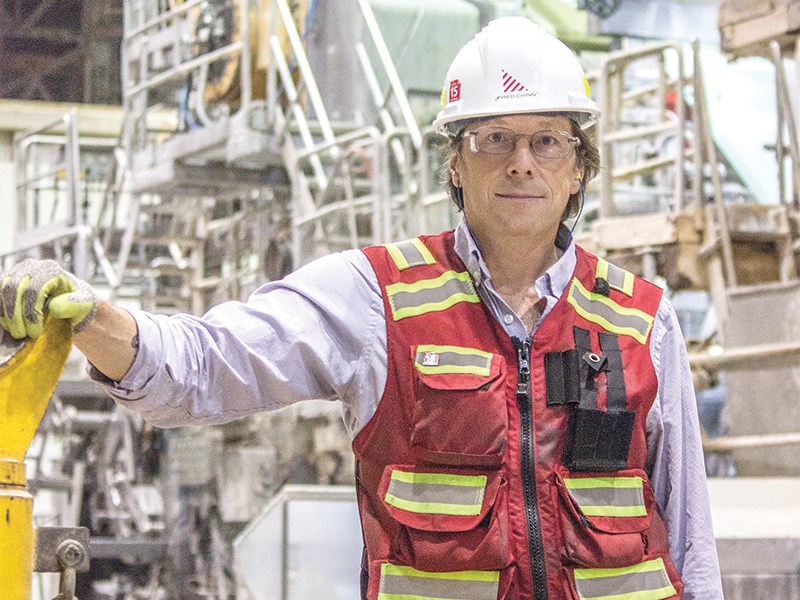Catalyst Paper Corporation’s Powell River division was, for a long period of time since its inception in 1912, at the centre of Powell River’s identity; it was mill town. Thousands of people used to work at the pulp and paper mill. At its height, more than 2,700 people were employed, but times change.
By 1990, the mill was down to 2,000 employees and that total decreased to 700 by 2001. Catalyst now employs approximately 360 workers in Powell River.
Declining markets for its newsprint and other paper products, and technological improvements, mean that even though the size of the mill has not shrunk by much, everything else about the industry has done so dramatically.
Unifor Local 76 represents about 220 of the current employees, including operations and maintenance workers, pipe fitters, electricians, welders and lab technicians. Its president, Mike Rumley, a 39-year mill veteran, has witnessed some tumultuous changes over the second half of his career. When he started working at the mill in the mid-1970s, the local represented around 1,800 members.
“There has been an incredible amount of downsizing,” said Rumley. “At one time, there were seven paper machines running. We’re down to two now.”
Unifor Local 1, responsible for providing the mill’s paper-machine operators, accounts for another 80 workers. The remaining 60 Catalyst employees include administrators and office support staff.
Catalyst Powell River division vice-president and general manager Fred Chinn said the past 10 years have been particularly challenging for the local mill. It is a well-known fact that there is less demand for the products it produces, he added.
“Every single printing and writing grade is in decline and has been in decline for some time,” said Chinn. “As a result, mills are shutting down; you hear about it almost monthly, some mill announcing a closure.”
Chinn said paper is a commodity and declining markets mean oversupply and flagging prices.
“You can’t charge more just because you’re Powell River,” he said, adding that the local mill has some challenges other, less-isolated mills do not have to deal with.
“This is a high-cost mill,” said Chinn, “and you could end up in trouble very quickly.”
Chinn said when he came to Powell River in 2014, he shut down paper machine number nine as the start of an effort to revitalize the operation. That meant trying to find other paper-based products to make, and ones that were in demand.
“We had to change everything we did or else we wouldn’t be here anymore,” said Chinn.
Rumley said the unions saw the threat of the mill closing, as Catalyst’s Campbell River operation did in 2009, and decided they could play a role in ensuring the mill’s future.
“I’ve done everything I can so there are still jobs behind me when I’m gone,” he said.
Between 2014 and the end of 2016, Chinn said Catalyst reduced its Powell River division operating costs by $34 million annually.
“Delivering that operating reduction, that’s not just cost-cutting, that’s doing things differently,” he said. “It was a very exciting time with hundreds of changes going on throughout the mill. It was also deciding what product we were going to make.”
Last month, Catalyst announced one of the new products that came out of those brainstorming sessions: food-grade paper. The company is calling the line of United States Food and Drug Administration-approved food-wrap products Bistro.
The mill is also converting paper machine number 11, enabling it to produce a product currently in the testing phase.
“We’re still very early in breaking in and we’re still learning,” Chinn, “but we’re doing something that will have a future for us. Everyone in this mill knows this is our shot.”
While Catalyst still faces some uncertainty about whether United States Department of Commerce will lift its countervailing duty on supercalendared paper, bringing a hydroelectric generator online last year and the BC government’s announcement that it would phase out sales tax on industrial electricity will continue to improve the situation.
City of Powell River’s revitalized taxation bylaw will be up for renewal this fall. In 2014, city council authorized a $500,000 tax increase for the mill. The company paid $2.75 million in municipal taxes in 2016.
Chinn said he and Catalyst head-office representatives have already met with mayor Dave Formosa and councillor Russell Brewer. Chinn said, and Formosa confirmed, that the company has opened its books for the city.
“What we’re hoping for is that we can receive continued support,” said Chinn, adding that he is expecting a tax increase, but is asking for it to be modest.
Formosa said that while the mill is in better shape than in recent years, its future is far from certain.
“They are now in a position that if given enough runway by the new owners and senior management, and hopefully we will continue to be supportive, that in the next two or three years they could go back to paying their full taxes,” he said.
Formosa said that, personally, he could support increasing the mill’s taxes by $250,000, if he had to.
Chinn said Catalyst appreciates the support the community has given the company through the relief over the years.
“We look forward to the day when we can happily be paying the tax rate, whatever it is, to support the community,” said Chinn, “but we also need as much help as we can right now.”
The new products have started to turn the mill’s situation around, said Chinn.
“We are not out of the woods by any means,” he said, “but we’ve now built these foundational blocks that give us a real shot at being successful.”



